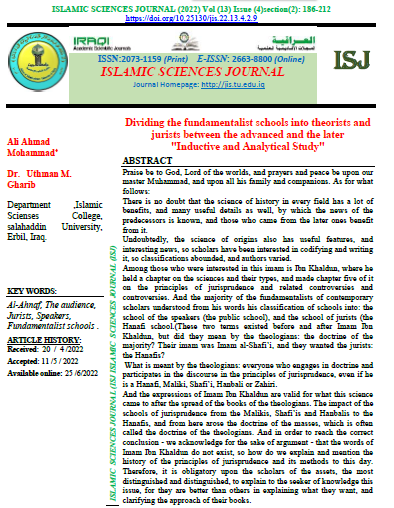Dividing the fundamentalist schools into theorists and jurists between the advanced and the later "Inductive and Analytical Study"
Main Article Content
Abstract
Praise be to God, Lord of the worlds, and prayers and peace be upon our master Muhammad, and upon all his family and companions. As for what follows:
There is no doubt that the science of history in every field has a lot of benefits, and many useful details as well, by which the news of the predecessors is known, and those who came from the later ones benefit from it.
Undoubtedly, the science of origins also has useful features, and interesting news, so scholars have been interested in codifying and writing it, so classifications abounded, and authors varied.
Among those who were interested in this imam is Ibn Khaldun, where he held a chapter on the sciences and their types, and made chapter five of it on the principles of jurisprudence and related controversies and controversies. And the majority of the fundamentalists of contemporary scholars understood from his words his classification of schools into: the school of the speakers (the public school), and the school of jurists (the Hanafi school).These two terms existed before and after Imam Ibn Khaldun, but did they mean by the theologians: the doctrine of the majority? Their imam was Imam al-Shafi’i, and they wanted the jurists: the Hanafis?
What is meant by the theologians: everyone who engages in doctrine and participates in the discourse in the principles of jurisprudence, even if he is a Hanafi, Maliki, Shafi’i, Hanbali or Zahiri.
And the expressions of Imam Ibn Khaldun are valid for what this science came to after the spread of the books of the theologians. The impact of the schools of jurisprudence from the Malikis, Shafi’is and Hanbalis to the Hanafis, and from here arose the doctrine of the masses, which is often called the doctrine of the theologians. And in order to reach the correct conclusion - we acknowledge for the sake of argument - that the words of Imam Ibn Khaldun do not exist, so how do we explain and mention the history of the principles of jurisprudence and its methods to this day. Therefore, it is obligatory upon the scholars of the assets, the most distinguished and distinguished, to explain to the seeker of knowledge this issue, for they are better than others in explaining what they want, and clarifying the approach of their books.
Article Details

This work is licensed under a Creative Commons Attribution 4.0 International License.
COLLEGE OF ISLAMIC SCIENCES, TIKRIT UNIVERSITY. THIS IS AN OPEN ACCESS ARTICLE UNDER THE CC BY LICENSE http://creativecommons.org/licenses/by/4.0/

